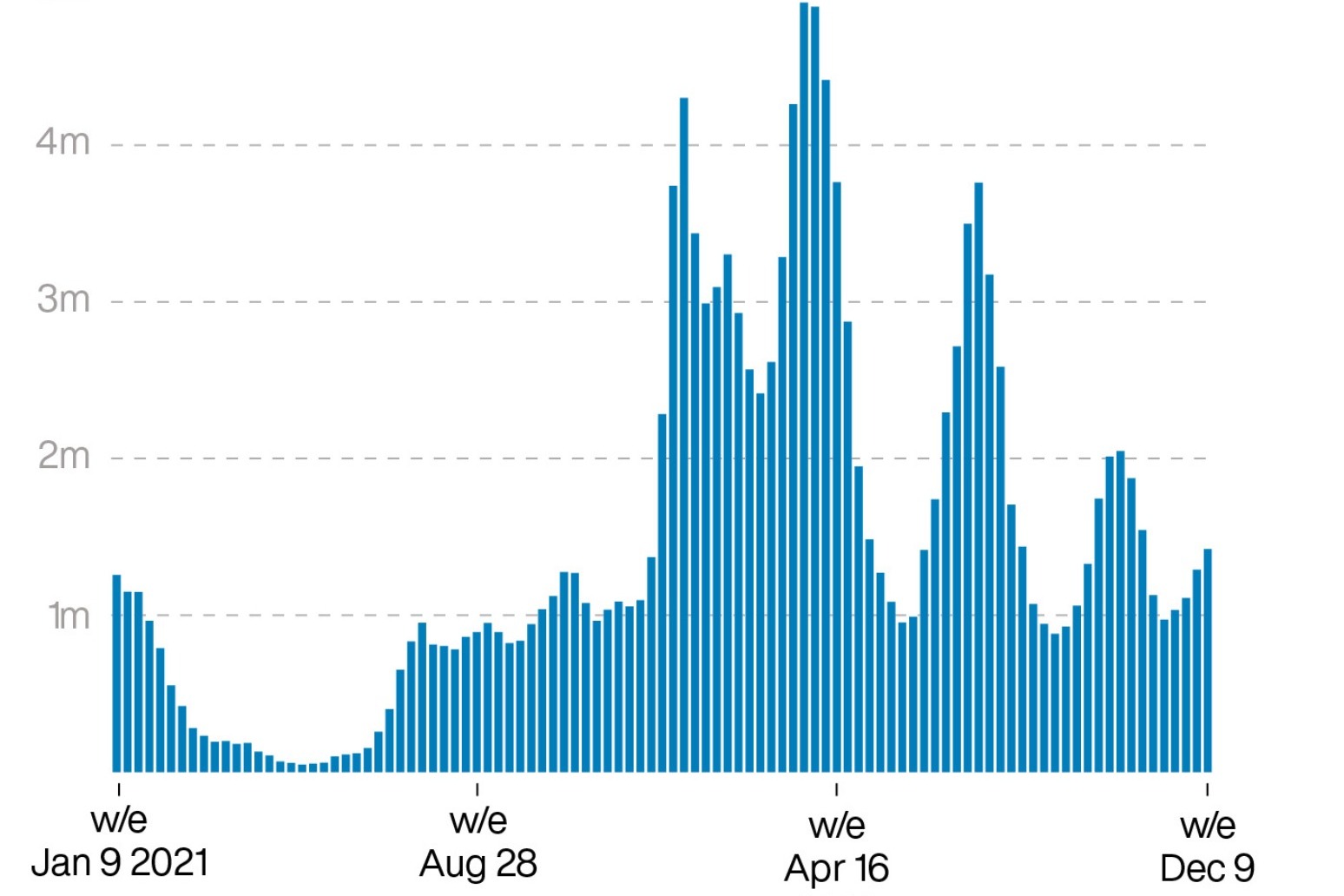
Covid-19 infections climb in England and Scotland as hospital numbers rise
Covid-19 infections increased in England and Scotland earlier this month, while the trend in Wales and Northern Ireland was uncertain, figures show.
A total of 1.4 million people in private households in the UK were likely to test positive for coronavirus in the week to December 9.
This was up from 1.1 million in late November but below the two million weekly infections in early October.
The estimates published by the Office for National Statistics (ONS) give a snapshot of what was happening in the UK at the start of December, when coronavirus was starting to become more prevalent among the population.
More recent data shows the number of people in hospital with Covid-19 in England, Scotland and Wales is on a clear upward trend, with patients in England up 29% in the past week to the highest level for nearly two months.
The ONS infection survey is the most reliable measure of the prevalence of coronavirus and is based on a sample of swab tests from households across the UK.
There is a lag in the reporting of the data due to the time it takes for the survey to be compiled, however.
Sarah Crofts, ONS deputy director for infection survey analysis, said: “Today’s data show that Covid-19 infections have risen for the fourth consecutive week in England, with cases also continuing to rise in Scotland.
“Over half of English regions saw an increase, while it’s a mixed picture for different ages.
“Infections have increased among most adults under 70, while secondary school-age children experienced a decrease in infections.
“We will continue to monitor the data closely over the coming weeks.”
The UK is facing its third winter in a row with Covid-19 on the rise.
But unlike in 2020 and 2021, when coronavirus was the main driver of sickness and hospitalisations, this winter has also seen a sharp jump in flu cases, putting extra pressure on NHS staff already struggling to clear a record backlog of treatment.
Dr Mary Ramsay, director of public health programmes at the UK Health Security Agency, confirmed there has been a rise in hospital admissions “for both flu and Covid-19 as people continue to mix indoors this winter”, adding it was “important to avoid contact with other people if you are unwell, in order to help stop infections spreading over the Christmas and new year period”.
The ONS data suggests coronavirus levels in early December were likely to be highest in Scotland, where around one in 40 is estimated to have had the virus in early December, or 130,900 people, compared with one in 60 in late November.
In England, one in 45 – 1.2 million people – were likely to have Covid-19 earlier this month, up from one in 60 at the end of last month.
In Wales and Northern Ireland, the ONS described the short-term trend as “uncertain”, with one in 55 (57,600 people) in Wales estimated to have the virus in early December, along with one in 50 (37,000 people) in Northern Ireland.
The percentage of people testing positive in Wales rose in the two weeks to December 8, the ONS added.
Hospital data gives a more up-to-date indication of the prevalence of Covid-19, with figures published this week suggesting the virus is circulating at increasing levels in much of the UK.
The number of people in hospital in England testing positive for Covid-19 stood at 8,643 on December 21, up 29% week-on-week and the highest total since late October.
Patient numbers in England have been on an upwards trend since the end of last month, though have yet to reach the sort of peaks seen during previous waves of the virus earlier this year, when the figure topped 14,000 during the summer and 16,000 in the spring.
In Scotland, 967 patients with Covid-19 were reported on December 19, up 27% on the previous week and the highest number since early August.
Wales reported 666 patients with Covid-19 on December 20, up 33% week-on-week and the highest number since mid-October.
In Northern Ireland patient levels are currently falling after a small peak in early October.
Published: by Radio NewsHub